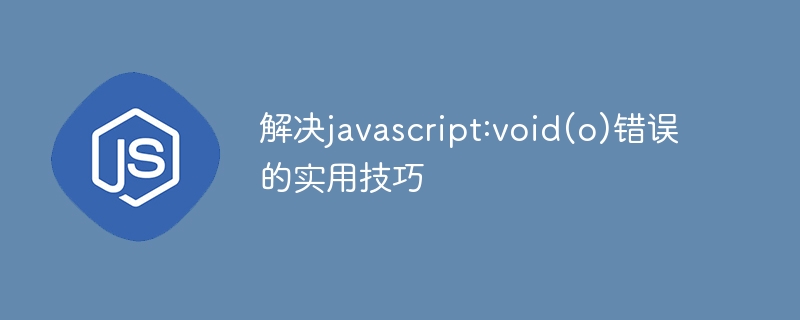Home >Web Front-end >JS Tutorial >Practical tips for solving javascript:void(o) errors
Practical tips for solving javascript:void(o) errors
- WBOYWBOYWBOYWBOYWBOYWBOYWBOYWBOYWBOYWBOYWBOYWBOYWBOriginal
- 2024-04-03 15:15:021118browse
The "javascript:void(0)" error occurs when passing a function name as a string because the JavaScript engine interprets it as a statement instead of a function name. Fix tips include: 1. Use Template Literals; 2. Use arrow functions; 3. Use the bind() method. These methods allow you to avoid errors when passing function names.

Practical tips for solving "javascript:void(0)" errors in JavaScript
"javascript:void(0) " error is a common JavaScript error that occurs when trying to pass a function name as a string. This is often caused by oversights in handling user input in JavaScript code.
Why does this error occur?
When you use the "javascript:void(0)" string as part of JavaScript code, the engine interprets it as a statement rather than a function name. Therefore, it throws "javascript:void(0)" error.
Practical tips to fix this error:
1. Use Template Literals:
Template literals (template strings) Allows you to embed expressions in strings more easily. Surround strings with backticks (`) and embed function calls within ${}.
// 错误示例
document.addEventListener("click", javascript:void(0));
// 使用 Template Literals 的正确示例
document.addEventListener("click", `${eventHandlerFunction}`);2. Use Arrow Functions:
Arrow functions are a simplified function syntax that combines the declaration and expression of anonymous functions into one line. You can use arrow functions to pass the function name to a string.
// 错误示例
document.addEventListener("click", javascript:void(0));
// 使用箭头函数的正确示例
document.addEventListener("click", () => eventHandlerFunction());3. Use the bind() method: The
bind() method creates a new instance of a function in which the this keyword is bound to the specified object. You can use this to create event handlers that can call functions with different this values.
// 错误示例
document.getElementById("button").addEventListener("click", javascript:void(0));
// 使用 bind() 方法的正确示例
document.getElementById("button").addEventListener("click", eventHandlerFunction.bind(this));Practical case:
The following is a practical case of using Template Literals to fix errors:
<html>
<body>
<button id="my-button">Click me</button>
<script>
document.getElementById("my-button").addEventListener("click", `${eventHandlerFunction}`);
function eventHandlerFunction() {
console.log("Button clicked!");
}
</script>
</body>
</html>Note:
- Make sure to define the function name before using the event handler.
- Always use strict mode in your code (strict mode sets mandatory scope for variables and functions).
- Understand the techniques of JavaScript event delegation to avoid adding event handlers directly to document elements.
The above is the detailed content of Practical tips for solving javascript:void(o) errors. For more information, please follow other related articles on the PHP Chinese website!
Related articles
See more- PHP serious fatal error handling:php Fatal error: Cannot redeclare class or function
- Detailed introduction to the error handling mechanism in golang
- What is error handling in PHP? Error code? Wrong trigger?
- PHP program access report 500 error handling plan
- How to implement error handling and custom exceptions in FastAPI

